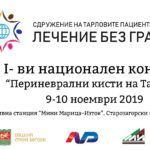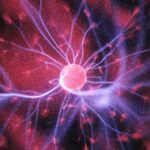 The First National Congress on Tarlov Perineural Cysts will be held in Stara Zagora on November 9 and 10, 2019 and it will be attended by leading specialists in the fields of neurology, neurosurgery, kinesitherapy and psychology. Patient organizations will also be part of the forum. The purpose of the event is to promote the disease, to inform and help people and also to explain to the patients the treatment options and their rights. For more information click here.
The First National Congress on Tarlov Perineural Cysts will be held in Stara Zagora on November 9 and 10, 2019 and it will be attended by leading specialists in the fields of neurology, neurosurgery, kinesitherapy and psychology. Patient organizations will also be part of the forum. The purpose of the event is to promote the disease, to inform and help people and also to explain to the patients the treatment options and their rights. For more information click here.
Featured posts
 Dystonia is a chronic and incurable movement disorder. This qualitative study aimed to enhance understanding of the condition by exploring the experience of living with dystonia. Interpretative phenomenological analysis was used to analyse data gathered through semi-structured interviews. Eight participants were recruited via a UK-based dystonia charity. Three superordinate themes emerged from the data: (1) dealing with ignorance and uncertainty: navigating health services with a rare, poorly understood condition; (2) the challenge of social isolation: overcoming barriers to positive social identity; and (3) fear of psychological explanations: the impact of stigmatised attitudes towards psychological explanations for dystonia symptoms. Coping with a rare and chronic condition led to participants feeling isolated and stigmatised by health care services and their communities. Participants were able to overcome this challenge to their identities through the use of social support, particularly from other people with dystonia. Recommendations for reducing the stigmatising experiences of people with dystonia can help to ease the process of adjustment to the illness and enable people to pursue meaningful lives and positive identities. Recommendations for research are aimed at increasing knowledge about these processes. For more information click here.
Dystonia is a chronic and incurable movement disorder. This qualitative study aimed to enhance understanding of the condition by exploring the experience of living with dystonia. Interpretative phenomenological analysis was used to analyse data gathered through semi-structured interviews. Eight participants were recruited via a UK-based dystonia charity. Three superordinate themes emerged from the data: (1) dealing with ignorance and uncertainty: navigating health services with a rare, poorly understood condition; (2) the challenge of social isolation: overcoming barriers to positive social identity; and (3) fear of psychological explanations: the impact of stigmatised attitudes towards psychological explanations for dystonia symptoms. Coping with a rare and chronic condition led to participants feeling isolated and stigmatised by health care services and their communities. Participants were able to overcome this challenge to their identities through the use of social support, particularly from other people with dystonia. Recommendations for reducing the stigmatising experiences of people with dystonia can help to ease the process of adjustment to the illness and enable people to pursue meaningful lives and positive identities. Recommendations for research are aimed at increasing knowledge about these processes. For more information click here.
 Werner syndrome (WS) is rare adult-onset progeria characterized by premature aging and early death. Patients develop normally until adolescence and usually present in early adulthood. Our case highlights a common presentation of this uncommon disease, wherein a 29-year-old non-obese male with no known risk factors developed uncontrolled diabetes, hypertriglyceridemia, and rapidly progressive atherosclerotic vascular disease. Careful observation with attention to the presence of characteristic physical features and subsequent genetic testing helped diagnose the patient with this uncommon progeroid syndrome. Our case adds to the literature about this rare disease especially in patients of middle-eastern descent and also highlights the importance of having a high index of suspicion for WS when the initial clinical presentation is atypical. For more information click here.
Werner syndrome (WS) is rare adult-onset progeria characterized by premature aging and early death. Patients develop normally until adolescence and usually present in early adulthood. Our case highlights a common presentation of this uncommon disease, wherein a 29-year-old non-obese male with no known risk factors developed uncontrolled diabetes, hypertriglyceridemia, and rapidly progressive atherosclerotic vascular disease. Careful observation with attention to the presence of characteristic physical features and subsequent genetic testing helped diagnose the patient with this uncommon progeroid syndrome. Our case adds to the literature about this rare disease especially in patients of middle-eastern descent and also highlights the importance of having a high index of suspicion for WS when the initial clinical presentation is atypical. For more information click here.
 Hirschsprung disease (HSCR) is a rare congenital disorder caused by an incorrect enteric nervous system development due to a failure in migration, proliferation, differentiation and/or survival of enteric neural crest cells. HSCR is a complex genetic disease, where alterations at different molecular levels are required for the manifestation of the disease. In addition, a wide spectrum of mutations affecting many different genes cause HSCR, although the occurrence and severity of HSCR from many cases still remain unexplained. This review summarizes the current knowledge about molecular genetic basis of HSCR. For more information click here.
Hirschsprung disease (HSCR) is a rare congenital disorder caused by an incorrect enteric nervous system development due to a failure in migration, proliferation, differentiation and/or survival of enteric neural crest cells. HSCR is a complex genetic disease, where alterations at different molecular levels are required for the manifestation of the disease. In addition, a wide spectrum of mutations affecting many different genes cause HSCR, although the occurrence and severity of HSCR from many cases still remain unexplained. This review summarizes the current knowledge about molecular genetic basis of HSCR. For more information click here.
Assessment of the risk and characterization of non-melanoma skin cancer in Kindler syndrome
 Kindler Syndrome (KS) is a rare genodermatosis characterized by skin fragility, skin atrophy, premature aging and poikiloderma. It is caused by mutations in the FERMT1 gene, which encodes kindlin-1, a protein involved in integrin signalling and the formation of focal adhesions. Several reports have shown the presence of non-melanoma skin cancers in KS patients but a systematic study evaluating the risk of these tumors at different ages and their potential outcome has not yet been published. We have here addressed this condition in a retrospective study of 91 adult KS patients, characterizing frequency, metastatic potential and body distribution of squamous cell carcinoma (SCC) in these patients. SCC developed in 13 of the 91 patients. The youngest case arose in a 29-year-old patient; however, the cumulative risk of SCC increased to 66.7% in patients over 60 years of age. The highly aggressive nature of SCCs in KS was confirmed showing that 53.8% of the patients bearing SCCs develop metastatic disease. Our data also showed there are no specific mutations that correlate directly with the development of SCC; however, the mutational distribution along the gene appears to be different in patients bearing SCC from SCC-free patients. The body distribution of the tumor appearance was also unique and different from other bullous diseases, being concentrated in the hands and around the oral cavity, which are areas of high inflammation in this disease. This study characterizes SCCs in the largest series of KS patients reported so far, showing the high frequency and aggressiveness of these tumors. It also describes their particular body distribution and their relationship with mutations in the FERMT-1 gene. These data reinforce the need for close monitoring of premalignant or malignant lesions in KS patients. For more information click here.
Kindler Syndrome (KS) is a rare genodermatosis characterized by skin fragility, skin atrophy, premature aging and poikiloderma. It is caused by mutations in the FERMT1 gene, which encodes kindlin-1, a protein involved in integrin signalling and the formation of focal adhesions. Several reports have shown the presence of non-melanoma skin cancers in KS patients but a systematic study evaluating the risk of these tumors at different ages and their potential outcome has not yet been published. We have here addressed this condition in a retrospective study of 91 adult KS patients, characterizing frequency, metastatic potential and body distribution of squamous cell carcinoma (SCC) in these patients. SCC developed in 13 of the 91 patients. The youngest case arose in a 29-year-old patient; however, the cumulative risk of SCC increased to 66.7% in patients over 60 years of age. The highly aggressive nature of SCCs in KS was confirmed showing that 53.8% of the patients bearing SCCs develop metastatic disease. Our data also showed there are no specific mutations that correlate directly with the development of SCC; however, the mutational distribution along the gene appears to be different in patients bearing SCC from SCC-free patients. The body distribution of the tumor appearance was also unique and different from other bullous diseases, being concentrated in the hands and around the oral cavity, which are areas of high inflammation in this disease. This study characterizes SCCs in the largest series of KS patients reported so far, showing the high frequency and aggressiveness of these tumors. It also describes their particular body distribution and their relationship with mutations in the FERMT-1 gene. These data reinforce the need for close monitoring of premalignant or malignant lesions in KS patients. For more information click here.
 Тази година 10-та Юбилейна национална конференция за редки болести и лекарства сираци ще се проведе под официалния патронаж на Министерството на здравеопазването.
Тази година 10-та Юбилейна национална конференция за редки болести и лекарства сираци ще се проведе под официалния патронаж на Министерството на здравеопазването.
В писмото си министъра на здравеопазването Кирил Ананиев изказва своето уважение към дейностите на Информационния център за редки болести и лекарства сираци. Той посочва още същественото значение на информираността при лечението на хората с редки болести и техните близки, с което се подобрява качеството им на живот. Министъра споделя, че със съвместни усилия могат да се подобрят условията за лечение на всички пациенти, включително и на хората с редки болести, чрез предоставяне на достъпна и достоверна информация за тези заболявания, както и за възможностите за лечение и рехабилитация.
Конференцията ще се проведе на 13-15 септември 2019 г. в Конгресен център на Международен панаир Пловдив. Основна тема на събитието ще бъдат новостите и актуалните тенденции в диагностиката, лечението и проследяването на редките болести, развитието на европейските референти мрежи и достъпа до иновации в областта на редки болести. Подробна информация за събитието, програмата и възможност за регистрация може да получите на официалната страница на събитието.

The Nobel Prize winner of the Medicine Award in 1993, Prof. Philip Sharp will visit “Alexandrovska” University Hospital. Prof.Sharp will give a lecture on “RNA interference and its medical applications” on 12th July 2019 at 11.00h in the “Maxima” auditorium of University Hospital “St. Ekaterina”, Sofia. The audience will include academic researchers, neurologists, specialistis in medical genetics, biology, chemistry and biochemistry. Representatives of patients’ organizations of people with rare diseases, journalists, medical professionals and others are also invited. There will be a discussion after the end of the lecture on which Prof. Sharp will answer questions from the audience. The press release of the event can be downloaded from this link.
 For the tenth consecutive year, the Institute for Rare Diseases and Orphan Drugs organises a national conference. This year the conference will be held under the patronage of the Health Commission at the 44th National Assembly of the Republic of Bulgaria.
For the tenth consecutive year, the Institute for Rare Diseases and Orphan Drugs organises a national conference. This year the conference will be held under the patronage of the Health Commission at the 44th National Assembly of the Republic of Bulgaria.
“Within its remit, the Health Commission has always been an open partner to support the efforts of institutions and non-governmental organizations to improve the development of prevention, diagnosis, treatment, rehabilitation and social care for people with rare diseases,” the letter said Dr. Daniela Daritkova.
The main topic of the event will be the novelties and current trends in the diagnosis, treatment and follow-up of rare diseases, the development of European reference networks and access to innovation in the field of rare diseases.
The 15th anniversary of the Information Center for Rare Diseases and Orphan Drugs (ICRDOD) will also be celebrated during the event. The Information Center started its activity in 2004 as the first information center of its kind in Eastern Europe dedicated to patients, organizations and medical specialists with an interest in rare diseases and orphan drugs. ICRDOD has been developing over the past 15 years with the support and assistance of 26 volunteer consultants – leading medical specialists from the university clinics in Bulgaria. For more information click here.
 Rare diseases (RDs) affect a small percentage of the population but can be severely debilitating and life-threatening. Historically, patient groups (PGs) have been the prime movers in raising awareness about these diseases and advocating for national supportive policies. They have also driven relevant research programs. In India too, PGs have made significant contributions to the national RD ecosystem. The objective is to assess the contribution of various Indian RD PGs, we carried out an interview-based study of 19 organizations. This study aims to highlight the origins and achievements of these groups and the challenges that they have faced. Of the 19 PGs, two are umbrella organizations, two are other organizations of national scope and 15 are disease specific groups. 14 interviewees were affected by an RD either directly or through a family member. If reinstated, and properly implemented, this policy could significantly improve RD management in the country. PGs have had a significant role in bringing diagnostics and treatments to India. They have also raised awareness about RDs and related issues such as newborn screening, prenatal diagnostics and genetic counselling. This study highlighted the recommendations of various PGs. The government should address these recommendations and institutionalize the participation of the PGs in formal decision making. For more information click here.
Rare diseases (RDs) affect a small percentage of the population but can be severely debilitating and life-threatening. Historically, patient groups (PGs) have been the prime movers in raising awareness about these diseases and advocating for national supportive policies. They have also driven relevant research programs. In India too, PGs have made significant contributions to the national RD ecosystem. The objective is to assess the contribution of various Indian RD PGs, we carried out an interview-based study of 19 organizations. This study aims to highlight the origins and achievements of these groups and the challenges that they have faced. Of the 19 PGs, two are umbrella organizations, two are other organizations of national scope and 15 are disease specific groups. 14 interviewees were affected by an RD either directly or through a family member. If reinstated, and properly implemented, this policy could significantly improve RD management in the country. PGs have had a significant role in bringing diagnostics and treatments to India. They have also raised awareness about RDs and related issues such as newborn screening, prenatal diagnostics and genetic counselling. This study highlighted the recommendations of various PGs. The government should address these recommendations and institutionalize the participation of the PGs in formal decision making. For more information click here.
 EU patients still face challenges in benefiting from the actions envisaged by the EU directive on cross-border healthcare, according to a new report by the European Court of Auditors. Only a minority of potential patients are aware of their rights to seek medical care abroad. At the same time, the auditors also found problems and delays in exchanging patient health data electronically between Member States. Moreover, actions to facilitate access to healthcare for rare disease patients need to be improved. For more information click here.
EU patients still face challenges in benefiting from the actions envisaged by the EU directive on cross-border healthcare, according to a new report by the European Court of Auditors. Only a minority of potential patients are aware of their rights to seek medical care abroad. At the same time, the auditors also found problems and delays in exchanging patient health data electronically between Member States. Moreover, actions to facilitate access to healthcare for rare disease patients need to be improved. For more information click here.
